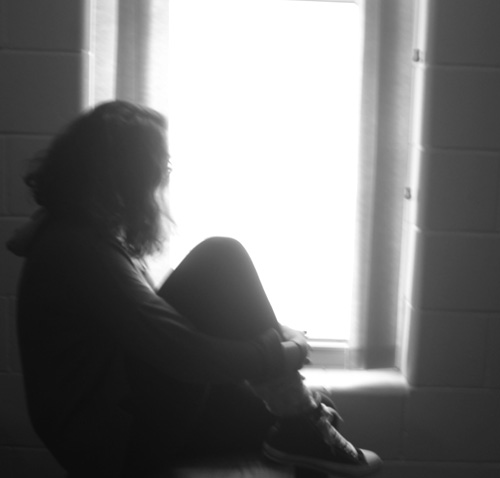A voice for the voiceless

Want to help the cause? Visit www.partnersintl.org for details
Imagine you’re an 18-year-old girl in your senior year of high school. No one at home cares for you, and you can’t remember the last time you heard the words “I love you.” Due to the lack of love and support in your home life, you’re very insecure. You are afraid to build relationships with other people and feel that you don’t matter and aren’t capable of anything; not even being loved. That is until you meet a handsome and charming boy who says all the right things at the right times.
He tells you you’re the most beautiful girl on the face of the earth and that he is hopelessly in love with you. He wants to give you everything the world has to offer. You resist his companionship at first, but slowly, the softness of his touch and kindness of his words break you open and all other ties you had to the world (school, home, friends, etc.) begin to fall away, one by one.
One night, he blindfolds you to enhance the surprise of a “special adventure.” You get in the car and he begins to drive. After what feels like forever, the car stops. Before you can get a word out, you are yanked from the car by your “boyfriend” and two other men and shoved through the doors of an isolated warehouse. You will be forcefully entered into a prostitution ring the following day; never to be free again. This is a process called “boyfriending,” and it is one of the most common practices in the business of human trafficking.
Human trafficking is a multi-billion dollar industry involving the worldwide trade of humans into slavery. Victims are captured to be exploited for horrors such as forced labor, prostitution, and even organ removal. According to the Trafficking Resource Center, there were approximately 20.9 million reported victims of human trafficking worldwide last year, hundreds of thousands in the United States. Out of the estimated 600,000-800,000 U.S. citizens trafficked across international borders each year, 80% are women and young girls, and half of them children.
Traffickers are very skilled in the tactics they use, and the people they choose to manipulate. In addition to “boyfriending,” traffickers will also use such tactics as capturing runaways, drugging, violent kidnappings, false promises of better homes, jobs, futures, or opportunities to travel, and threatening victims into submission.
While anyone can become a victim of human trafficking, those who appear to be more vulnerable or insecure are targeted. Runaways and homeless youth are among the most common captives. “[Traffickers] seek out people’s vulnerabilities and often go for those with a rough home life and less of a support system,” said former NPHS graduate and activist Chelsea Weber (’06). Once a victim has been captured it’s very difficult to escape due to the indescribable violence used to maintain control.
Through Weber’s previous involvement with an organization called “End Slavery Tennessee” in Nashville, her passion for helping victims of human trafficking has grown immensely. “I went through training in Atlanta to become involved, and then spent a while doing behind-the-scenes work. I traveled with people for speaking engagements and helped with many fund-raising events for the cause,” Weber said. She loves the work and hopes to make directly dealing with victims a lifelong career.
This school year, North Platte High School junior Megan Wullschlegar developed a desire to help the cause. Most of her work thus far has been through a challenge called “Dressember,” which gears primarily towards victims of sex trafficking (containing 80% of all victims). “By wearing dresses every single day of the month, you can raise awareness to those around you about the problem with sex trafficking,” Wullschlegar said. “Especially when you’re living in a cold state and you’re wearing dresses throughout the winter.”
“I wasn’t able to raise a whole lot of money this year, sadly, because I was still trying to get the hang of it and wrap my mind around it. But I would also pray, and I would post pictures of me in my dress on Instagram/Facebook which helped raise awareness,” she said.
Wullschlegar plans to continue raising money and awareness through this challenge in the future. “This year, I’m going to try to make it more obvious about how important this cause is, and start right away on raising money. I’ll probably even write some blog posts about it. I will also try to push my friends to participate. The more people the better,” said Wullschlegar.
Weber says that the most important first step in helping is to get to know the people around you; both for your own safety and the safety of others. Another important way to help is by educating yourself and other people. When it comes to specific challenges such as “Dressember” Wullschlegar says, “Make sure you know and understand the cause. If you want to help trafficking, you have to dig deep and understand why you’re doing it in the first place. Why get involved in something you don’t know anything about?”
Weber says it’s important to educate people on the signs and tactics of trafficking, not just on rescue. “If you ever suspect something dangerous with yourself or someone you know, talk to someone immediately. Do not be quiet about it,” she said.
Our society, including young people dealing with it first-hand, are vastly unaware of the dangers of trafficking or how many innocent people have had their freedom stripped from them. “This isn’t something that’s happening far away. It happens right around us and we’re just not aware of it,” said Weber. She says now that you’re aware, it’s time to speak up, spread awareness, and give a voice to all who have fallen voiceless.

North Platte High School - Class of 2017
Being part of the school newspaper staff has taught me the importance of communication and teamwork to achieve...

Emily Schilmoeller • Mar 31, 2016 at 12:39 PM
This article shows that human trafficking is a serious problem. People go through it everyday and it is disgusting. This problem needs to stop, and quick .
Kaytlynn • Feb 8, 2016 at 12:38 PM
It’s so sad how people are sold for such disgusting things. We need more people putting a stop to it.
Seth • Feb 8, 2016 at 10:31 AM
It shows something that needs top be shown but isn’t because most people are scared and shows people how cruel and evil the world really is